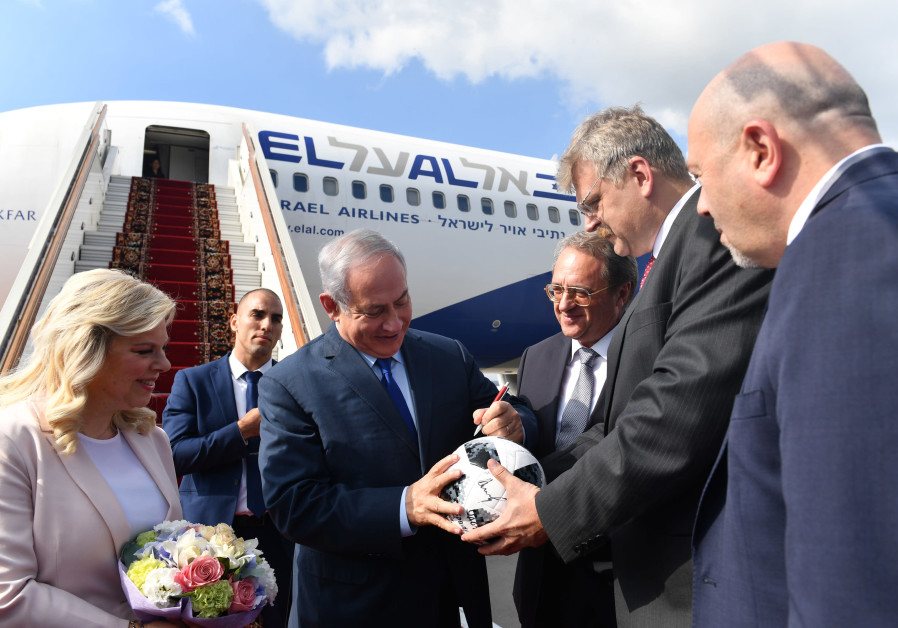Analysis: The message in the Netanyahu – Putin meeting

Prime Minister Benjamin Netanyahu and his wife Sara Netanyahu land in Moscow, Russia. Netanyahu signs a football. . (photo credit: KOBI GIDON / GPO)
MOSCOW – Many and varied are the reasons why Prime Minister Benjamin Netanyahu has an interest in meeting Russian President Vladimir Putin as much as he does.
And Netanyahu does meets the Russian leader a lot. His meeting with Putin Wednesday evening in the Kremlin was the ninth time the two men have met since Russia became active militarily in Syria in September 2015. This means Netanayhu has met more with Putin during this three year time frame than with any other world leader, including US presidents Barack Obama and Donald Trump.
Netanyahu has characterized these meetings as “very important for Israel’s national security,” and – following Russia’s entrance into Syria – the reason why is self evident. Russia is camped out militarily in Israel’s back yard, and it is important for the two countries to talk and coordinate so each understand the other’s interests, so that they do not clash.
It is no small achievement that, indeed, there has not been any clash – accidental or otherwise – between Russian and Israeli forces in Syria over the last three years. And this is something that neither should be taken for granted nor just happens. The type of understandings and cooperation necessary to avoid those clashes has come out of the meetings between the leaders at the top.
These nine meetings have ensured that Israel knows what Russia’s vital interests are in Syria, that Russia understands the vital concerns of Israel, and that both countries steer clear of harming what is of critical importance to the other.
That’s why the meetings are important for Netanyahu, and these are among the reasons that they are important for Putin as well.
But for Putin there is more: he is using Netanyahu’s visits to send a message to various different audiences. This is also why – of late– Netanyahu’s visits to Russia have been very high profile.
Inviting Netanyahu to Moscow when the eyes of the world are on the capital because of the World Cup is a high profile visit. Inviting hm to Moscow in May to sit with him and review the parade in Red Square marking the 1945 victory over Nazi Germany is a very high profile visit.
This is not Netanyahu secretly arriving in Amman for a meeting with Jordanian King Abdullah II, far from the cameras. This is the prime minister and Putin meeting in the full glare of the cameras for the whole world – and all the Russian people – to see, and doing so time and time again.
What message is Putin trying to send with these meetings?
First, and perhaps least important in the Russian president’s mind – though not insignificant – is the message to his own people.
After four years of being sanctioned and basically blackballed diplomatically by the West for his invasion and annexation of Crimea, Netanyahu’s meetings with Putin show the Russian people that Moscow is still a very significant player that can’t be ignored. Sure, Russia might have been drummed out of the G8, which has reverted to being the G7, but it’s counsel and favors are sought after by leading international figures.
As odd as it may sound, Netanyahu gives Putin a degree of legitimacy that the Russian leader lost to a large degree in the west with his Crimean adventure.
Then there is the message theses visits send to the Americas.
Syria and the Middle East will obviously be a major issue of conversation at Putin’s summit with Trump next week in Helsinki. Meeting with Netanyahu just days before, and prior to the unveiling by the Administration of its long-awaited blueprint for Mideast peace, is Putin’s way of reminding Washington that he and Netanyahu are on close terms, that regional issues are being discussed between them, and that Moscow can not be left out of any broader regional plan that the Americans might unveil.
And finally, and perhaps most importantly, is the message Putin standing alongside Netanyahu sends to the Iranians.
Russian and Iranian interests in Syria are far from identical, and Moscow has let the Iranians know on more than one occasion that they would like them to leave Syria. The meeting with Netanyahu , the closeness between the two, is a subtle hint to the Iranians that if they do not accede to Russia’s demands – something that is by no means a given – then Russia may give Israel a freer hand to operate in Syria than it has been given up until now.
The meetings between Putin and Netanyahu have become part of the message, but so too are the events that comes directly before or after the meetings. Within hours of Netanyhau’s return from Israel last May, Israel struck hard at Iranian positions in Syria after Iran fired missiles at the Golan, in a retaliatory action for a previous raid attributed to Jerusalem.
That timing was obviously not coincidental, and it beggars belief to think such an action was not discussed in the Kremlin just hours before it took place.
So, too, this weeks attacks at the T4 air base, also attributed to Israel, should not be divorced from Wednesday’s meeting. The timing of these alleged actions sends an unmistakable message to the Iranians: Russia is not standing in the way of the Israeli actions.






Comments are closed.